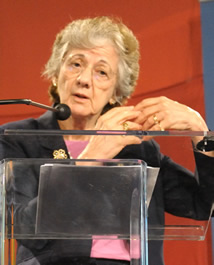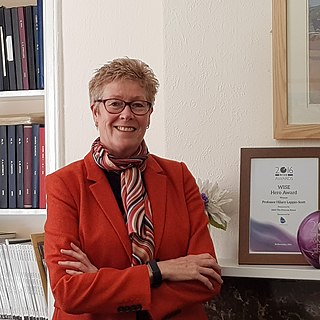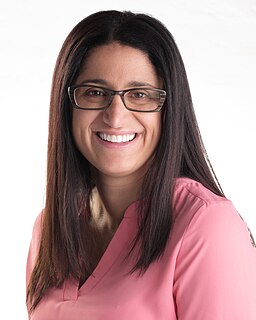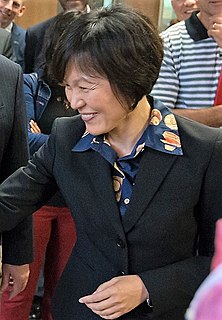Related Research Articles

Rita Rossi Colwell is an American environmental microbiologist and scientific administrator. Colwell holds degrees in bacteriology, genetics, and oceanography and studies infectious diseases. Colwell is the founder and Chair of CosmosID, a bioinformatics company. From 1998 to 2004, she was the 11th Director of the National Science Foundation.

The Environmental Research Institute of Michigan (ERIM) was a research institute at Ann Arbor, Michigan, founded in 1972. The institute contributed to the development of remote sensing, radar, and holography. ERIM grew out of a military and environmental research arm of the University of Michigan, the Michigan Aeronautical Research Center, later known as the Willow Run Research Center.
Sara Lawrence-Lightfoot is an American sociologist who examines the culture of schools, the patterns and structures of classroom life, socialization within families and communities, and the relationships between culture and learning styles. She is the Emily Hargroves Fisher professor at the Harvard Graduate School of Education and a 1984 MacArthur Genius.

Carolyn Ruth Bertozzi is an American chemist. Bertozzi is known for her work on bioorthogonal chemistry, a term she coined. At Stanford University, she holds the Anne T. and Robert M. Bass Professorship in the School of Humanities and Sciences. Bertozzi is also an Investigator at the Howard Hughes Medical Institute (HHMI) and is the former Director of the Molecular Foundry, a nanoscience research center at Lawrence Berkeley National Laboratory. She received the MacArthur "genius" award at age 33. In 2010, she was the first woman to receive the prestigious Lemelson-MIT Prize faculty award. She is a member of the National Academy of Sciences (2005), the Institute of Medicine (2011), and the National Academy of Inventors (2013). In 2014, it was announced that Bertozzi would lead ACS Central Science, the American Chemical Society's first peer-reviewed open access journal that offers all content free to the public. As an open lesbian in academia and science, Bertozzi has been a role model for students and colleagues.

Marc Edwards is a civil engineering/environmental engineer and the Charles Edward Via Professor of Civil and Environmental Engineering at Virginia Tech. An expert on water treatment and corrosion, Edwards's research on elevated lead levels in Washington, DC's municipal water supply gained national attention, changed the city's recommendations on water use in homes with lead service pipes, and caused the Centers for Disease Control and Prevention to admit to publishing a report so rife with errors that a congressional investigation called it "scientifically indefensible." He is considered one of the world's leading experts in water corrosion in home plumbing, and a nationally recognized expert on copper corrosion. He is also one of the whistleblowers in the Flint water crisis, along with Dr. Mona Hanna-Attisha.

The Swiss Federal Institute of Aquatic Science and Technology is a Swiss water research institute and an internationally networked institution. As part of the Swiss Federal Institutes of Technology Domain, it is an institution of the Federal Department of Home Affairs of the Swiss Confederation. The Eawag is based in Dübendorf near Zurich and Kastanienbaum near Lucerne.
Johannes "Hans" van Leeuwen is educator, engineer, inventor, researcher, and entrepreneur. He is an emeritus professor of Civil, Construction and Environmental Engineering at Iowa State University and an entrepreneur in ethanol co-product development. His research and innovations have worked to solve various problems including, new water purification methods, a way of creating food and animal feed from waste, and a process in making the purest alcohol ever made.

Hilary Margaret Lappin-Scott FLS is a British microbiologist whose field of research is microbial biofilms. In 2009 Hilary was elected as the second female President of the Society for General Microbiology (SGM) in 70 years and served in this role until 2012. In September 2019 she was elected as President of the Federation of European Microbiological Societies (FEMS), being the first President from the UK.

Linda Marie Abriola is an American environmental and civil engineer who specializes in the study of organic chemical liquid contaminants in porous media.

Daniel Barton Oerther is an American Professor. He is best known for leadership bridging engineering and nursing to advance environmental health practice through science diplomacy. Oerther uses 16S ribosomal RNA-targeted techniques for fundamental studies of the ecology of bacteria in engineered and natural systems. He promotes transdisciplinarity among engineers, nurses, and sanitarians to improve access to clean water, nutritious food, and energy efficiency in developing communities. And Oerther practices innovation in the scholarship of teaching and learning.

Bruce E. Rittmann is Regents' Professor of Environmental Engineering and Director of the Swette Center for Environmental Biotechnology at the Biodesign Institute of Arizona State University, and a member of both the Civil Engineering and the Chemical Engineering Sections of the National Academy of Engineering. He was elected to the Academy in 2004.

The Flint water crisis was a public health crisis that started in 2014 and lasted until 2019, after the drinking water for the city of Flint, Michigan was contaminated with lead and possibly Legionella bacteria. In April 2014, during a budget crisis, Flint changed its water source from treated Detroit Water and Sewerage Department water to the Flint River. Residents complained about the taste, smell, and appearance of the water. Officials failed to apply corrosion inhibitors to the water, which resulted in lead from aging pipes leaching into the water supply, exposing around 100,000 residents to elevated lead levels. A pair of scientific studies confirmed that lead contamination was present in the water supply. The city switched back to the Detroit water system on October 16, 2015. It later signed a 30-year contract with the new Great Lakes Water Authority (GLWA) on November 22, 2017.

Mona Hanna-Attisha is a pediatrician, professor, and public health advocate whose research exposed the Flint water crisis. Her research revealed children were exposed to dangerous levels of lead in Flint, Michigan. She is now the director of an initiative to mitigate the impact of the crisis. She is commonly referred to as "Dr. Mona". She is the author of the 2018 book What the Eyes Don't See, which The New York Times named as one of the 100 most notable books of the year.
Natalia Trayanova FAHA FHRS is a Professor of Biomedical Engineering in the Department of Medicine at Johns Hopkins University. She directs the Alliance for Cardiovascular Diagnostic and Treatment Innovation
Beronda Montgomery is a writer, science communicator, and Michigan State University Foundation Professor in the Departments of Biochemistry & Molecular Biology and of Microbiology & Molecular Genetics. She is also a member of the MSU-DOE Plant Research Laboratory. Her research group investigates how photosynthetic organisms adapt to changes in their environment. Her scholarship extends beyond biology and into studying mentorship and faculty development to develop evidence-based strategies to foster equity and inclusion in academia. Together with Tanisha Williams and other members of the Black Botanists Week organizing committee, Montgomery co-organizes Black Botanists Week.
Joan Bray Rose is an American microbiologist.
Akissa Bahri is a Tunisian agricultural engineer, a former professor at the National Agricultural Institute of Tunisia, and the current Agriculture Minister of Tunisia. She has previously been Director for Africa at the International Water Management Institute (2005–2010), Coordinator of the African Water Facility at the African Development Bank (2010–2015), and Director of Research at the National Research Institute for Agricultural Engineering, Water, and Forestry (INRGREF) in Tunis, Tunisia (2016–2017).

Qilin Li is a Chinese environmental engineer who is a professor of Civil and Environmental Engineering at Rice University. She develops new technologies to analyze and treat contaminated water. Li is a Fellow of the International Water Association.
Bridget Rosaleen Scanlon is an Irish and American hydrogeologist known for her work on groundwater depletion and groundwater recharging, and of the effects of climate change and land usage patterns on groundwater. She is a senior research scientist in the Bureau of Economic Geology at the University of Texas at Austin, where she is head of the Sustainable Water Resources Program. Her research has included the use of GRACE satellite data to compare drought conditions in Texas and California.
Mona N. Fouad is an Egyptian-American physician. Fouad is the inaugural holder of the Edward E. Partridge, M.D., Endowed Chair for Cancer Disparity Research at the University of Alabama at Birmingham. As a result of her "lifetime of exceptional work in health and medicine," Fouad was also elected a member of the National Academy of Medicine in 2017.
References
- ↑ "Altarum's Endowed Professorship at University of Michigan Awarded to Lutgarde Raskin". Altarum Institute. 2013-08-30. Retrieved 2016-07-07.
- ↑ "Lutgarde Raskin elected to the AAM". University of Michigan. 2009-01-30. Retrieved 2016-07-07.
- ↑ "Business". Water Environment Federation. 2012-09-01. Retrieved 2016-07-07.
- ↑ "Winners of the ISME/IWA BioCluster Award 2016 Announced". International Water Association. 2016-05-25. Retrieved 2021-02-15.
- ↑ "National Academy of Engineering Elects 106 Members and 23 International Members". National Academy of Engineering. 2021-02-09. Retrieved 2021-02-15.
- ↑ "Boosting bacteria in drinking water may improve health". New Scientist. 2012-08-10. Retrieved 2016-07-07.
- ↑ "Tap Water is not as Safe as We Think". The Cutting Edge. 2012-08-26. Retrieved 2016-07-07.
- ↑ "UM declined to team with lead expert in Flint". The Detroit News. 2016-02-18. Retrieved 2016-07-07.